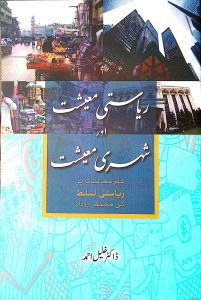In Pakistan, almost everybody, especially economists, politicians, etc, wants to tax the people, but they never tell, WHY.
Because there is no anti-tax narrative.
Because there are no anti-tax writers but hardly a few.
Because there are no anti-tax economists but hardly a few.
Because there is no anti-tax opposition.
Because there is no anti-tax political party (but one: Civil Pakistan Party).
Because there is no anti-tax lobby.
Because there are no anti-tax MPAs/MNAs.
Because there is no anti-tax newspaper.
Because there is no anti-tax TV channel.
Because there are no anti-tax voices but hardly a few.
Let’s develop and promote an anti-tax narrative.
Let’s inspire/train more and more anti-tax writers.
Let’s inspire/train more and more anti-tax economists.
Let’s create/gather an anti-tax opposition.
Let’s help/strengthen a political party that’s anti-tax (There is already one: Civil Pakistan Party).
Let’s create an anti-tax lobby.
Let’s inspire/train anti-tax MPAs/MNAs.…
سیاسی قضیے: 19اپریل، 2018
فرض کیجیے نواز شریف آج وزیرِ اعظم ہوتے، تو اس سے عام شہری کو بھلا کیا فرق پڑ جاتا۔
اور کیا اس صورت میں مسلم لیگ ن ’’ووٹ کو عزت دو‘‘ کا بیانیہ زبان پر لاتی۔ قطعاً نہیں۔ سب کچھ حسبِ معمول چل رہا ہوتا اور راوی چین ہی چین لکھتا۔
کیونکہ نواز شریف اب وزیرِ اعظم نہیں، لہٰذا، یہ بیانیہ چلایا جا رہا ہے کہ ووٹ کو عزت دو۔ اس سے صاف مراد یہ ہے کہ جسے ووٹ ملیں، اسے حکومت کرنے دو۔ وہ جیسے چاہے، اسے ویسے حکومت کرنے دو۔
سوال یہ ہے کہ اب تک پاکستان میں اتنی حکومتیں بنیں بگڑیں، مگر کیا کسی حکومت نے ’’ووٹر کو عزت دو‘‘ کی طرف توجہ دی۔
کسی نے بھی نہیں۔
یہ تو اب چونکہ خود نواز شریف پر افتاد آن پڑی ہے، سو انھیں ’’ووٹ کو عزت دو‘‘ کا معاملہ یاد آ گیا ہے۔
ویسے …
This April a bill was submitted in the National Assembly which is yet another attempt to make the citizens of Pakistan “loyal” to it. The bill seeks to amend the Article 63 of the Constitution – an article that sets the criteria for the members of parliament and provincial assemblies. The bill requires that any person who holds dual nationality and owns bank accounts and assets in countries other than Pakistan will not be able to be a member of the parliament and provincial assemblies as well as public service, both civil and military. It ensued from the womb of Muslim League (Q). Leaving aside the doubts whether it is part of a political ploy or a trick of political blackmailing, the bill needs to be examined on its merits.
This article does not aim to dwell on the issue of dual nationality. The same
Note: I sent this piece of writing to all the newspapers one by one; none bothered to see it or use it, that I am justified to conclude!
Why taxes are not a political issue in Pakistan?
All the politics is about collecting and spending taxes; but unfortunately that reality does not translate into political issues in Pakistan.
What it translates into is power-politics pure and simple! See the arrogant issueless politics of Pakistan Tehreek-e-Insaf; see the pseudo-development politics of Pakistan Muslim League (N); see the outdated Roti-Kapra-Makaan politics of Pakistan Peoples Party (P); see the identity-less politics of Awami National Party; and also see the self-centered religious politics of Jamat-e-Islami, Jamiat-e-Ulema-e-Islam (F). At the end of the day, all of their politics is about seeking power and state-benefits; or it is politicking on pseudo-issues ranging from anti-Americanism and pro-Palestine rallies to this or that religious or sectarian wrangling.
The
It seems the present dispensation of PML-N believes in no principles of taxation. It’s just there to extort whatever amount of taxes the Federal Board of Revenue may extort from the citizens in the form of bribes and in the name of taxes: of course, for itself as well as for the government.
However, the principles of taxation, the PML-N may be supposed to believe in, manifest themselves in the measures it announces in the budget and then obtains their approval from the parliament. That much is least controversial; what is controversial is the way the new taxes are conceived and implemented. As a rule, it’s the income or the consumption which is universally taxed. Also, the just taxation is not spending-driven, which certainly is the case as far as the PML-N government’s economic policies are concerned.
No doubt, there are countless
The cities and suburbs of Pakistan are bursting with millions of teeming citizens, old and young, men and women and children alike. They earn their livelihood by small selling of goods or services which unimaginably involves hard labor with meager income. Or they are employed by private entrepreneurs who have to incessantly struggle against the vagaries of state’s regulators and tax officials. They form the larger chunk of a population of 18 million plus. It is they who cast vote to send a political party in the parliament, but cherish no hope this will ameliorate their life conditions they know from their past experience. This is one side of the picture.
The other side reveals itself in the headlines of the daily newspapers and news channels. One newspaper’s headline reads as: army chief pays morale boosting visit to ISI HQ (Inter-Services Intelligence Headqarters). Another headline says: defense ministry seeks cancellation
Here is the Introduction by the authors:
The recipe for growth is well-known. Most economists would agree that lower taxes and less regulation can encourage entrepreneurship and job creation. Yet, many governments are unwilling to introduce such reforms. An important reason is concern over a voter backlash. Jean-Claude Juncker, a likely candidate for the EU-presidency after two decades as Luxemburg’s Prime Minister, famously lamented “We all know what to do, we just don’t know how to get re-elected after we’ve done it.” Based on an analysis of 109 governments in developed countries, we would suggest that Juncker’s view is mistakenly gloomy. Although market-oriented reforms may initially meet fierce resistance, governments that introduce them are more often than not rewarded by voters.
In our new book “Renaissance for Reforms” we look at the pace and direction of reforms in 29 OECD governments
…



